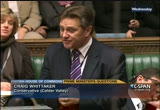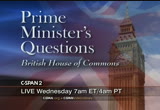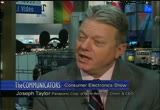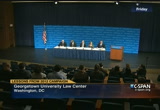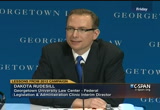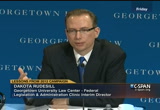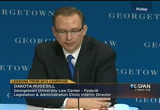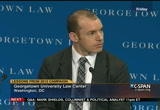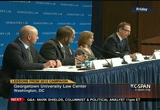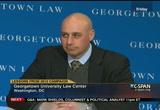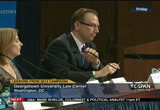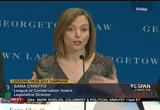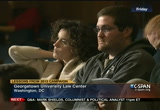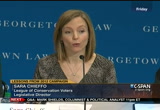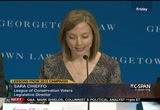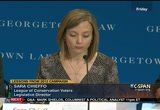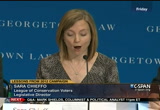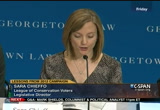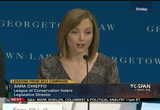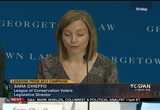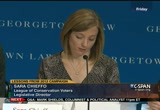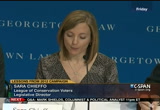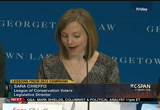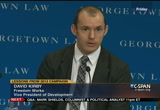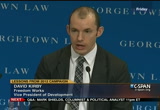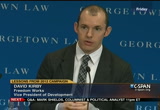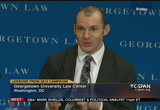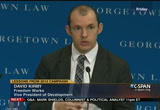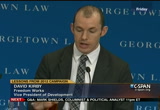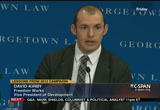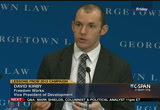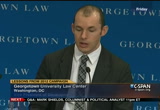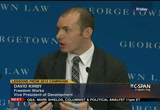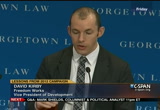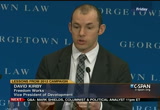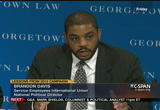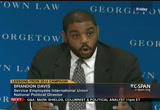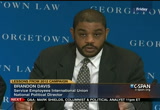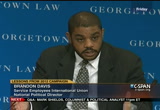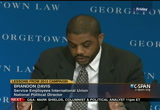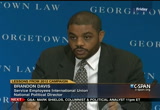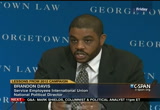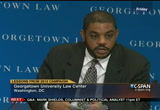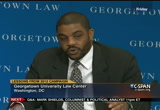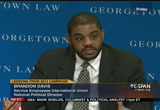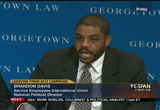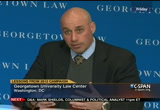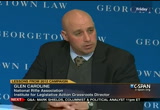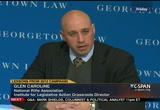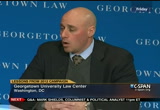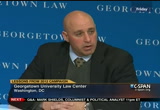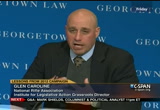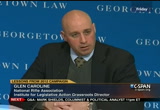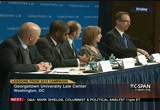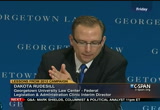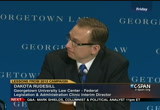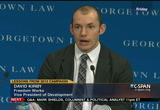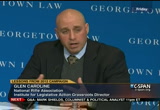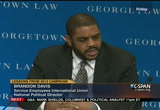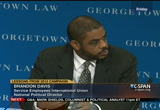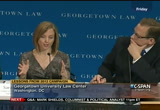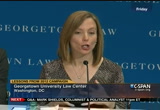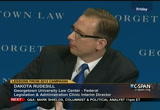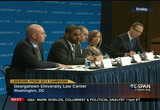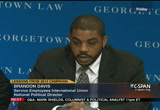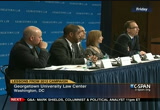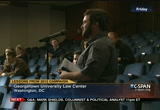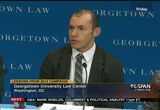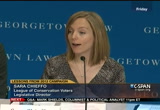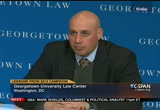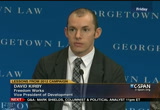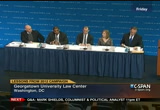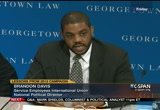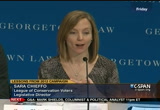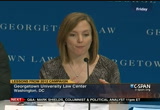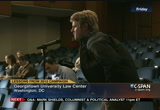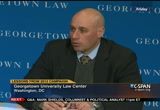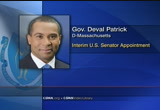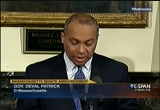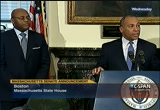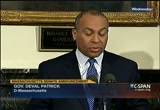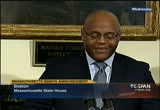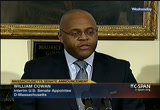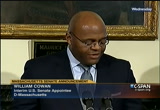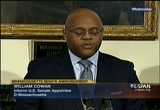tv News Politics and Public Affairs CSPAN February 3, 2013 9:35pm-11:00pm EST
9:35 pm
whether he will be taking seriously the liberal democrats who were queuing up today to resign their posts after voting against the government's vote? >> i would say, clearly there is a profound disagreement. i would say to everyone in the house of commons who voted for unequal constituency boundaries that are costly and unfair, they will have to justify that to their constituents. >> order. [captioning performed bynational captioning institute][captions copyright nationalcable satellite corp. 2013]>> you have been watching prime minister's questions. question time airs live on c- span to every wednesday, seven: 00 eastern when the house of commons is in session, and sunday nights at 900 eastern and pacific. watch any time at c-span.org, were you can find video of past prime minister's questions and other british public affairs programs.
9:36 pm
>> next, a discussion about the lessons learned from the 2012 campaign, and how they apply to the current session of congress. at 11:00, q and a with mark shields. then, in other chance to see british prime minister david cameron taking questions from members of the house of commons. >> if you have got some hotshot who just got his phd in computer science from stanford, she is getting offers from all over the world. if you can say, you can stay in some limbo for six years -- that is not competitive. >> hungers can do a lot. -- congress can do a lot. you do not have to be a fission on your iphone to understand the application on policy and what makes it work and what makes it not work. >> it is difficult to make investment decisions and expect any return on investment when you have no way to predict the future. our difficulty is there is no consistency or certainty in our policy decisions.
9:37 pm
>> the government's role in technology and policy from this year's ces international consumer electronics show. monday night on "the communicators" at 8:00 eastern on c-span two. >> friday, the national rifle association grassroots director said gun control proposals have led to increased nra membership. he was joined by officials from other interest groups to discuss the lessons learned from the 2012 campaign, and how they might apply to the current 113th congress. the georgetown university law center in washington hosted this event. it is one hour and 15 minutes.
9:38 pm
>> welcome back. we will begin the second panel. our first panel was about and featured the political operatives and their view of the 2012 election cycle, and its lessons for the 113th congress. their work was done -- the most intensive work was done during the 2012 election cycle, but as we heard, >> they are gearing up for the 2014 election cycle with an eye to what happens during the 113th congress. campaign managers for the 2014 election are being hired. if you want to be part of that process, and i still have a resume to dust, i would encourage you to rapidly dust. we are moving to our second panel, which is about the interest groups which are going
9:39 pm
to influence the direction of legislative activity in the congress during the 113th congress. for my new colleagues on this panel, one of the analytical frameworks we use at georgetown law is what i call lp4. i means -- analyze things in terms of five aspects. look at an issue at the intersection of law and policy. l is law. the first p is process, which produces the law. the next p is policy. policy drives the process, which produces the law. the next p is politics. sometimes that is tough to disaggregate from policy. if we define politics as the acquisition, maintenance, and
9:40 pm
use of power, that is distinct from the substantial policy issues. the final p is personality. individuals matter, some individual personalities, especially so. it influences the entire flow. we will hit on a number of these aspects of the law policy intersection. as we talk with the expert individuals who represent a number of interest groups that are tremendously influential to the flow of law and policy in washington, and the congressional article i process. to my immediate right is sara chieffo. she is the legislative director for the league of conservation voters. the league works to turn
9:41 pm
environmental values into national priorities. sara chieffo plays a role in the production of the league's national environmental scorecard, which has been the nationally accepted yardstick to rate congress on environment and energy issues. welcome, sara. i thank each member of our panel for providing bio. we have david kirby from freedom works. he is vice president of development at freedom works. freedom works has done itself a great service with its name. it has to be one of the better organizational names around town. it works on a number of level. it produces freedom.
9:42 pm
freedom works. i say congratulations to you on that. we need something kind of crisp like that. david is vice president of development at freedom works managing their fundraising operations. he is also a policy analysis at the cato institute. he is the author of a number of publications and studies with regard to libertarian voting habits in the age of the obama administration and current politics. welcome, david. brandon davis, from the service employees international union, seiu. brandon is the national political director. seiu represents over 2 million workers in healthcare, public and, property services.
9:43 pm
brandon leads the organization's political program. he is tasked with mobilizing union members to win key elections while building political infrastructure across the country to create real policy change with a focus on working families. prior to coming to seiu, he worked on electoral campaigns. he worked on senator claire mccaskill's campaign for victory. we have glen caroline joining us from the national rifle association. he is the director of grassroots division. he implements the nra political and legislative grassroots programs and the campaign operations, voter registration drives at the national, state, and local levels. mr. caroline is responsible for
9:44 pm
the recruitment, training, and mobilization of the election volunteer coordinators nationwide. since the 2008 election cycle, glen caroline has hired, trained, and supervised 627 field representatives. welcome, glen. we will follow the same format that we did before. each of our panelists will have eight minutes to lay out their initial thoughts for our discussion. then, we will have 20 minutes or so of moderated discussion. then, we will go to q&a from our community here today. with that, sara chieffo. >> thank you so much, dakota. can folks hear me all right? ok. thank you for that kind introduction. it is a pleasure to be back here. in addition to serving as the
9:45 pm
legislative director for the league of conservation voters, i am also an alum of georgetown university. the league of conservation voters' mission is to turn environmental values into national priorities. since 1970, we have been advocating for sound environmental policies, electing pro-environment candidates who will implement such policies, and growing our national network in over 30 states. i will cover two main topics for you guys. i look forward to a lively discussion with my colleagues on this panel. i will cover the main lessons from the 2012 cycle from the league of conservation voters' perspective and talk about what those lessons mean looking ahead to the 130th congress that has just begun and what it will do for the obama administration
9:46 pm
second term. the first main lesson is that voters sent a clear and strong message that they want members of congress to stand up for the environment and for public health. we pulled our resources on a focused set of races. we won bigger than ever. despite the millions that were spent by outside groups backed by polluting industries, we saw the president reelected, the senate become more pro- environment, which was quite a tall order. we saw a handful of house republican incumbents who were climate change deniers deseeded for those positions. let me give you some stats on the electoral work that we engaged in and the 2012 cycle. lcv spent over $14 million this cycle. that is more than the last three cycles combined. we also raised our contributed
9:47 pm
more than $2 million to pro- environment candidates. we won 15 out of 17 of our target races, including seven new climate champions to the senate. reelecting senators who voted to defend the environmental protections agency's ability to take actions on global warming. millions were spent on tv ads attacking there records. those ads were not successful. we also helped elect two governors in tight races, in montana and in washington state. governor ensley may be the greenest governor in the nation ever. in the house, we launched a electoral process called the flatter five. we targeted five incumbent representatives for being climate change deniers. we defeated four of those five and nearly knocked out all five.
9:48 pm
we think that program demonstrated that being a climate change denier is not just that policy. it is that politics as well. we also reelected the president with the help of over lcv 10,000 members who volunteered. in the presidential campaign, romney's opposition to the wind industry played a key role in swings states like colorado and iowa. we defeated two anti-environment candidates in the primary, in pennsylvania and texas. they were targeted for their opposition to climate change and clean energy legislation. lcv has a signature list call our dirty dozen list. we target some of the heaviest polluter candidates for defeat. we defeated 11 of those 12. that is quite a return on our investment. it represents the most successful year.
9:49 pm
in the senate, we continue to see a firewall in the senate of pro-environment candidates and senators who will act as a firewall against assaults on the environment that we anticipate will continue. the second main take away was that the message beat the money. we were dramatically outspent by karl rove and big polluters. we had the public on our side. voters wanted leaders who confront the challenge of climate change. we saw attacks on senators in montana and ohio on their energy policies. we saw attacks from mitt romney, heather wilson in new mexico. those attacks proved unsuccessful.
9:50 pm
to put hard numbers on this -- the money spent by the affiliated crossroad organization only represented seven percent of the money spent on winning races -- just seven percent. contrast that with the record -- 83% of the money we spent was spent on winning races.one great example is in massachusetts. we were touting scout brown -- oftt brown's abysmal record turning around and voting consistently for taxpayer handouts to those industries that are already making your record profits at the pump. pre and post polling from those ads showed that his record dropped among independent a shocking 21%.
9:51 pm
so i offer that as an anecdote of powerful the ties are in terms of public mind of who they trust in elected office and who they are taking their money from and whose bidding they are doing. folks want to know more about our work you can check it out at our website. i got some copies of our elections report in back if you would like to take them at the end. you don't have to take my word for our success source i can offer two quotes from senators we worked with. senator elizabeth warren said they did an incredible job of educating voters about scott brown's ties to big oil. that was essential in my victory. when carl row started pouring money into new mexico to defeat me, they pushed back to help sure we won this race. so pretty powerful endorsements from races where we worked. let me close with a few forward
9:52 pm
looking comments on the second obama term. sp despite these electoral victories, we believe congress is a dysfunctional place to do business and we think advancements in congress on environmental policies are slim. that means the main opportunity for forward progress in the next few years with the president authority through executive action he can take. we anticipate that we'll continue to see pretty broad and sweeping attacks on our air, our water, our land, our wild life from the boehner led house of representatives and in the senate we anticipate our senate allies will stand strong against these misled attacks. as i said, this election cycle demonstrated there is strong support for addressing climate change. this is heightened in the wake
9:53 pm
of super storm sandy and this being the hottest year on record for our globe. we are going to see further action on climate change coming from the president in his second term which he made a commitment in his speech in tackling climate change. now the president possesses some very powerful tools to make progress on the climate crisis. much of that authority stems from the environmental protection agency's role in implementing and enforcing the clean air act. it's been affirmed by the supreme court. the president's first term took several actions to reduce pollution from cars and trucks and doubling our nation's renewable energy sources. they proposed first standards to reduce pollution from power plants. that is in draft form without for public comment and had a
9:54 pm
record breaking 3 million comments in support that exceeds any other. and we think it non-straits the public appetite for strong action on climate change. we are pushing for standard producing carbon producing from power plants to be announced soon and finalized with all due haste. power plants are our nation's single largest source of carbon pollution representing 40% of our nation's annual contributions. we are encouraged by the comments from the president's comments in his inaugural address. another lesson we think will bear on this 113 congress is that the public strongly supports the e.p.a. scientists doing their job protecting the air we breathe and water we drink. we hear talk in this town of e.p.a. run amuck or gone too far.
9:55 pm
when we look at this issue across the country, voters trust them to do this job of protecting the air we breathe and water we drink and expect them to do. so the people they don't trust to do this is congress, especially members of congress who are taking campaign contributions from polluting industries. this is widespread, it's not just the bigger metropolitan areas. we did polling areas in 32 swing districts across the nation and found across the southeast, midwest there is a strong support and trust in the e.p.a. and their scientists. another lesson we think will hold an impact on what happens this congress is that politicians who take money from big oil companies and vote to protect their taxpayer handouts are on dangerous ground. we anticipate we will continue to see in this series of budget and spending and sequestration fight
9:56 pm
that is will dominate much of the discussion here inside the beltway. we will continue to see the president and allies in congress call for an end to these harmful handouts in our nation's largest oil companies. we've seen strong support for clean energy and energy efficiency investments. it's a chance for forward progress on in building our economy and moving ahead from the 21st century. so we anticipate that we'll continue to see calls for expanded investments in energy. and energy efficiency is where we've seen bipartisan support and we're hopeful for progress. there are areas outside of that there might be progress. one sear reforming our nation's chemical laws that govern chemicals used in our workplaces. with that i'll close and look forward to my other panelist's
9:57 pm
remarks. >> i know that we have some new faces in the crowd who weren't here before. if you have a device my advice is to silence it. >> so the first time i realized that something was changing in america was in september 2009 at the taxpayer march in washington. i came down to check that out and i found hundreds of thousands of people there and many were holding this nerdy libertarian science. how did an obscure economist it on a protest sign outside of the capital? that is something i had never seen before in politics. there have been two elections since then -- 2010 and 2012.
9:58 pm
if you look more deeply at the data, there is a lesson to be learned about the emerging libertarian center of american politics. this may not be how you think of freedom works. freedom works got the most press for campaigns in the house and senate. we worked to take out and retire republican senators orrin hatch and dick lugar, and works to support candidates like ted cruz and jeff flake. the reason i marched in 2009, and the goal today, is not really about electing politicians. not really about republicans. it is about policy change. freedom works aims to end the stalemate over spending and debt. right now we have a bipartisan consensus to keep kicking the can down the road and spending more money that we do not have. freedom works's model is to be a grassroots service center to millions of activists, whether they are to party supporters,
9:59 pm
ron paul supporters, fiscal conservatives, or libertarians. i would like to make three points about 2012. first about changing demographics. the second point is about the tea party. the third point is about grassroots tactics. first, about demographics. for all the talk about hispanics, blacks voters, white males, unmarried women, young people, the less well understood trend is the growing libertarian sector of american politics. or years, exit polls asks a question that asked voters there references in the size of government. do you believe government should be -- do more things to solve problems, or do you believe the government is doing too many things that are left -- better left to individuals and businesses? in 2008, 51%, a majority of americans, said government should do more to solve problems. four years later, 2012, it flips -- now 51% believe the government is doing too many
10:00 pm
things. a majority of americans think government is growing too big. one other trend in the exit polls -- for the first time a majority of americans think that same-sex marriage should be legal. that is why it passed in maryland, maine, and washington. it is on the ballot area and if you take these two data points together, and the government is too vague and that they should stay out of things like same- sex marriage, what you find is that there is this group of fiscally conservative but socially moderate to liberal voters. i wrote a book about the voters. we can buy it on amazon. they tend to be moderate, urban, well educated and independent. in 2012, gallup data showed that
10:01 pm
independents were the fasting growing demographic in america with now 40% of americans calling themselves independent an all time high. the only political brand in america that is worse than democrats is republicans. in other words, most americans outside of washington don't want anything to do with the political parties. so actually the big headline in 2012 is that many of these independents stayed home. 2012 was a low turnout election. 3 percentage points fewer americans showed up in 2012 than in 2008 and fewer americans showed up this year than 2004. mitt romney barely won as many votes as john mccain did in 2008. if you compare preelection estimates to exit polls, what you find is 5 percentage points of independents didn't show up. so the party that actually figures out how to represent these independents, and my hunch
10:02 pm
is many of them are these social liberal voters is going to be ahead in the demographic race. that's why you saw smart democrats actually run functionally libertarian campaigns. notice democrats who won, they ran on fiscal issues and distanced themselves from the president. they stole the rhetoric of fiscal conservatives. this is also why you found republican candidates who won, they ran on fiscal issues but they didn't emphasize abortion. over time, i believe the party that embraces this libertarian center of the public will come ahead in the demographic battle. the second point i'd like to make is about the tea party.
10:03 pm
some people think the tea party lost the election particularly in the senate. and the argument goes something like that this n. 2010 there was kristine o'donnell and in 2012 there is today akin. todd akin. what we need is safe on the republican side, reliable, moderate candidates. and the lesson learned is we have to stop this tea party from taking over the process. anyone in the audience heard this argument? >> so several points to make. first this is a pretty self- serving argument for politicians who want to get taken out in primaries. but todd akin was never tea party. he was an earmarker and opposed by every tea party group. akin was so bad he didn't even get sarah palin's endorsement. somehow after his rape comment that got national news the media labeled him tea party and it stuck. we wouldn't touch him.
10:04 pm
we called for him to immediately drop out. but it was establishment republicans who came to try to help him in the end. the national republican senatorial committee put money in their race at the end, not tea party groups. the third problem with this tea party argument, it doesn't make sense when you look at the data. look at the safe candidates that they backed. tommie thompson in wisconsin. tommie thompson was the perfect moderate candidate in a winnable race in wisconsin. and the others were supposed to be easy wins but they all three lost. if you look at the data and compare vote performance of a basket of candidates who were tea party guys like josh in ohio, jeff in arizona and tom in pennsylvania and you compare those to tommie thompson, those establishment guys did worse.
10:05 pm
they did twice as bad for vote performance. the reason this lesson is important it's like tp gang warfare in politics over the 2014 elections. nobody wants to have to go through that. that's why you saw people like lamar alexander and lindsay gram worried. i would argue this is good for the process. one of those p.'s in your introduction. as long as politicians think they can say and do whatever they want in washington and no one is going to hold them accountable at home they will keep kicking the can down the road. so the final point i want to make is about tactics because i think one lesson to learn is too much money has been spent on tv ad buys relative to grassroots.
10:06 pm
hundreds of millions of dollars on outside groups on tv ads. and it didn't really buy much but grassroots seems to be the future. obama learned this early on. he had a four year head start and with his data machine, they built a kind of grassroots tactical edge that is the model of politics. my favorite example of this is that the obama campaign actually hired a guy in cleveland who is sole job it was to go to work shops all day he'd go to one barbershop, then another, he'd sit around talk to people, what are the hopes and dreams. what is going on in the family. what are their financial problems. so when it came time to turn them out on election day, it's like turning out your friend. now i don't care how much money you put into media buys you
10:07 pm
cannot duplicate that connection with voters. it seems that strategists are catching on. but there has to be a caveat. 2012 was not 2010. 2010 i would say was a policy referendum on policy issues, healthcare, bailout spending. 2012 at the end of the day was a personality contest at the presidential level. mitt romney was the next white guy in line and like bob dole. no doubt republicans will lose that contest every time. the obama won a tactical grassroots victory against a very weak candidate. but now that strategists are recognizing grassroots is the future. i don't think the republican party will be successful with this. they have such low credibility with the grassroots they couldn't done kate the obama machine if they wanted to.
10:08 pm
that's why freedom works will only grow over time. in conclusion, i viewed 2012 as a stalemate election. the republican house majority was retained from 2010. the composition of senate actually became slightly more fiscally conservative with ted cruise and neff flake and the president won with his emphasis on grassroots. but the big story is growing demographic in america, that fiscally conservative independent group. the lesson is if you align yourself with those voters in the policy instance of what they care about then you're going to be well positioned for the future. both parties will tack toward this libertarian center over time. thank you. >> thank you to the georgetown law center for hosting this conversation today. i'll be at the game tomorrow. i'm going to be brief.
10:09 pm
i get the pleasure and the honor of representing working families on this panel. and i want to be brief because i look forward to a back and forth with my colleagues on the panel. we've talked about takeaways on this election, we've talked about the makeup of the senate. i look forward to talking more because i think there were some moves forward fiscal liberalism thinking in the senate. so i look forward to talking about that. i think there is one big takeaway then i want to share the story of the work i see working families took on in this election. this was an election about two different points of view in the country. i cannot remember a time when the debate in the country was more focused on issues and more focused on a specific set of issues.
10:10 pm
so i think what we heard the electorate say was a repudiation of candidates like mitt romney were putting forward like you are in this on your own. that the country is set up in a way that if you can market, you can make it and if you can't, too bad. i think there was a real embrace of a different idea that president obama put forward not only in the election but beginning in 2008 and moving through his most recent speech at the inauguration that we are in this together. and it's an idea that we certainly embrace as the american labor movement and service employees union. as was said in the beginning we are a labor union of 2.1 million members across the country. we represent workers, service employees, we represent home care workers in the healthcare field and custodians and public workers.
10:11 pm
and in representing those members we haven been able to build what i this is one of the most effective if not the most effective grassroots operation in the country. we see grassroots as not just the future but the past and has been a part of our effort for quite some time. i think it is no secret working families have been under an attack since the 2010 election. we have been under a messaging attack for the last 30 years. and this attack over the last two years has taken shape at the state level. but it's been an attack on a lot of different fronts whether it's on workers rights or unions to collectively bargaining like we've seen in wisconsin and new hampshire over the last two years or the attack on voting rights.
10:12 pm
the attack on voting rights that seem to disenfranchise those in communities of color or working families. we've seen it in the economic attack the imbalance in income that is growing in this country from c.e.o.s who are making 750 times the hourly wage of the employees. we've seen it also in terms of the economic imbalance in our system, the citizens united ruling and all of those things coming together in a coordinated attack on working families. so when our members came together in the summer of 2011 to think about this election and what we needed to do in this election, we balked away from that conversation with asset of goals re-electing president obama and champions for working families but we also walked away with a recognition from our members that we've won elections before. in 2008, our members went out and joined with other partners and won at every level. win ago loan is not enough.
10:13 pm
it is a prerequisite because you cannot make policy change without winning elections. but it is inefficient. we not only needed to win in this election, but we needed to win on a mandate. it needed to be about something. we needed to take that mandate, not in numbers, but in issues mandate, one we could fight on in policy and make policy change. and we focused on a couple of areas. job creation. and everyone paying their fair share of taxes. the third thing we focused on was ending cuts to vital services mike medicaid and social security. and we wanted to create a fair path to citizenship for all immigrants. so we went into focusing on that as our effort this year. to do this our members said we had to be more efficient, more effective and more focused than we've ever been before. because on top of everything else we were facing this terrible imbalance created by citizens united.
10:14 pm
we said we were going to do asset of things. we were going to protect and expand access to the vote for communities of color and working families. we said we were going to particularly focus in the latino community which we watched in 2010 as a candidate for governor in california said one thing in english and a totally other thing in spanish and felt like she could walk away with a confused electorate and not pay the price for what she said in english. we were not going to allow that divide to create a confusion in the latino community.
10:15 pm
beyond that we said that we were going to shape the debate by investing your resources in paid media in a way that showed the contrast that existed between candidates that were standing with working families and those that wanted to perpetuate the status quo of a growing gap. those were the things we wanted to focus on. and we built a program that could succeed around that. we said we wanted to build a program that would win in the changing electorate this country was facing. we focused in the african-american american and latino community. but we set out with our members in the lead. we ran this program under asset of clear tactics were that taken on before. one a massive field program we're proud of. our members as volunteers, our members as paid staff. those taking leave of absence from their job to work on this campaign because of the stakes. we supplemented that work in the field with our work in media and mail and communicating with voters about the issues that were facing the country. when we walk away we feel good about the numbers. we look at the african-american community where the turnout in 2008 was maintain in the overall electorate in 2012.
10:16 pm
we look at the latino vote that went from 9 or 10% of the electorate to 11% depending on which polls you look at. that vote became more democratic but that vote supported at a higher level pro worker candidates going from 67% to 71% support for president obama. in union household votes we worked to expand the way the vote not only interacted at the ballot box but impacted voters knocking on doors and talking to people in their communities and believe that is the most effective way to move a message. and the vote that came larger and more progressive.
10:17 pm
we are proud of a 77% win ratio. you've heard folks begin to focus on the sunlight's foundation analysis. they said they were 84% efficient. where we invested we got an 84% return on our investment. something we are proud of given the economic imbalance that exist. and i want to share with you some numbers our members did in the field. one our members knocked on 5.5 million doors across the country over a 240 day span. for those of you who have knocked a door for a weekend, you know how daunting a task that is. we had members who knocked on doors 240 days so real dedication. 75,000 new registered voters. we invested $4.3 until voter registration this year to ensure the tact i cans being put-- the tactics being
10:18 pm
put forward to suppress the vote were not successful. over the air we ran 64 different television and radio ads including a spanish language expenditure. we believe the largest the country has ever seen we did in partnership with priorities. lastly our mail program, over 9 million pieces of mail communicating with voters. we take great pride in this 77% ratio. we take great pride in the efficiency numbers. but what we take the greatest pride in is the work our members did in shaping the debate on the core issues. we now have a president who has won election and reelection talking about the need to increase taxes as a way to create revenue to protect vital services. we have an election that has been won by a new majority, a new electorate, a new coalition that has spoke loudly and clearly that immigration reform has to be a key issue. and we're seeing democrats and republican epiphany about this issue and creating a path to
10:19 pm
citizenship. we are seeing a debate in the country that is going to lead to us electoral wins because you win elections to change policy. but now we are having a debate in the country about policies. and that is going to lead us to better job creation and lead to us a place where close quality gap in the country. and so my takeaway as i said in this election, is that we are in this together. and now i look forward to talking a little bit as we go throughout the panel about how our members didn't come off the doors after the election. elections are simply a flash point in our cyclical calendar now where we are fighting to change and cement in a direction for the country.
10:20 pm
so we'll continue to fight in a direction in the country that builds an economy that works for us all and i look forward to talking about that as the panel goes on. >> thank you. >> thank you for including me in this panel. i've been impressed with what i've heard so far. i think one of the things you will find is despite all of us advocate for different issues and may represent different constituents. there are common takeaways. i want to begin with an observation i made with reporting after elections you determine how well an organization fared. i think there has been too much emphasis on the causal relationship and oversimplification of how much an organization spend on a race and whether they win or lose. money is important in politics, all the things we do and all the things you hear about cost money.
10:21 pm
but i want to talk about some of the takeaways that you don't read about in the national press that were the keys to our successes in the 2012 elections and will be the building blocks of the national rifle association moving toward. one of the things i learned is the more localized and the longer sustainable presence we had on the ground t better results we had. this year we expanded our campaign field representative program further than we have before. we employed 25 campaign reps in 13 different states targeting different congressional races. these were beam embedded in their district doing nothing but to motivate and turn out the pro second amendment community in support of our candidates through traditional and non- traditional means.
10:22 pm
when you look at the races we targeting our efforts we thought it could push a candidate over the victory line. these were not easy races. of those races we enjoyed a 92% success rate. so by having them set up offices and go to the different gun shops and go to the gun shows and be at the shooting ranges and at the county fares and at the nascar events, they became part of the community and were able to interact with the constituents we were trying to mobilize and then turn out our vote on election day. i don't think in this day in age there can be any substitute moving forward for a more sustainable personalized relationship between field staff and the constituents they are trying to mobilize. we are seeing there is no long ernie intermission, there is no such thing as an off election year. every off year there are states that have state level elections that organizations such as the
10:23 pm
national rifle association needs to engage in. >> there are things that crop up. but an organization that tried to shut off and start up in an election year does so at its own pearl.-- own peril. we are in a grassroots campaign mode always trying to enhance and improve our program so we are ready for the next election. it has become a year round on year off year endeavor and i think it will continue to be that way. we are seeing more of a reliance on social networking, not just to deliver ads but to promote activities and promote events. one of the things we are doing a much better job is competing for better demographics. for example we know there is a right constituents si at testimony ledge that support the
10:24 pm
second amendment. you may not think it but we've experienced it. our most popular grassroots program is n.r.a. university to educate them on the second amendment and transform them into activists. this is the most popular program we v. we can't keep one requests we get. we did 46 universities in 15 different states across the country. these college students who attended were integral parts of our volunteer networks that our representatives were using for door knocking, phone calls to work at events. so i think we're really seeing the power of a more localized sustainable presence. a reliance in integration if you will of social networking is a great way to communicate not just with the younger generation but with a wider demographic because more people are using social applications to get news and information as it pertains to issues or even political candidates and elections.
10:25 pm
so i think moving forward, as you know, we've been in the news a little bit here and there so we will be busy. we will use that campaign model which captured a lot of energy and enthusiasm and a large number of political volunteers and we'll transform that enthusiasm and energy into legislative activism. since december our association has gone up to 4.4 million deuce paying members. when our rights come and you tack as they presently are in congress and elsewhere, they are going to rise to the occasion and get engaged. i think any casual observer in politics know there is no substitute for the programs the n.r.a.'s grassroots division can offer buzz because we are large and educated and get involved in the legislative and political process. we will be preparing right now to engage in campaign activities for the hand full of states that will have off year elections as a ramp up in preparation for 2014 already laying the ground
10:26 pm
2014. i would dare say there wasn't a candidate anywhere in america in 2012 showing he or she was a supporter of gun control. i challenge anyone to show me one where a candidate said i support gun control. that may be different in 2014 but our goal in empowering our grassroots is two sides of the same coin. we dedicate a lot of resources to educating them to make sure they understand the i did names of the debate and they get trained to be more effective activist and activating them to e-mail their law makers to attend rallies and town halls to register voters to go to gun shows to sign up n.r.a. members. our cycle has transformed from an election psych toll a more john going period to work to improve the activity of our
10:27 pm
members and we will be fully engaged in 2013 as well as 2014 as well. i don't want to take too much time because i see our time is getting short and i'm more interested in the questions and comments you all have. i look forward to hearing from you the audience. >> thank you glen for your comments and each of you on the panel. if we were to think back to what this conversation may have sounded like two cycles ago or one cycle ago, it would probably have some different themes that we'd here.-- hear. so at this point after the 2008 elections we would be talking
10:28 pm
about whether this was a post partisan moment, whether this was a progressive moment and people were wondering about the direction the newly elected president would take, that the democratically controlled congress would take as well. one cycle ago at this point in 2011 we would have been talking even more about the tea party than the discussion that we've had so far. now both of these things, both of these directions for conversation, post partisanship
10:29 pm
and that's the direction or a progressive moment or the tea party, both of these are not as much a part of the conversation today. we're at a different moment. in the opening comments we've had from our expert panel of individuals representing important interest groups, we've heard different takes on the 2012 election. is it an election that produced stalemate? is it one instead that produced a mandate for conservation or for action on behalf of working families? is it a flash point? or sit kind of -- or sit one moment in a broader process which glen car line described as a perpetual campaign. is the 113 congress going to be different? has this election yielded aid congress and washington which is going to operate differently and feel differently or can we expect more of the same? >> i will say more of the same. as i argued, it was a stalemate, no house has changed. the 2010 house majority was retained. as i said the senate became
10:30 pm
slightly more fiscally conservative. many voters didn't show up. many voters remaining to be frustrated. we're sick of the partisan gridlock. but there is a bipartisan consensus to keep kicking the can down the road. i think the debt ceiling went like groundhog day. it's like this time we're going to have this debate. then at midnight on new year's eve we pass a bill and give senators six minutes to reid it before it goes and we've now avoided the fiscal by kicking the can down the road which now we passed a bill to push off until may the reckoning for the debt ceiling. nobody has come to the table to try to fix things. i say the senate hasn't actually passed a budget. the president and democrats haven't passed a budget in four years. there is a fundamental inability for congress to do their job.
10:31 pm
you are supposed to pass a budget by april 15. you are supposed to reconcile all those bills by october. that hasn't happened in four years. instead we've had this crisis atmosphere where things are passed in the middle of the night and nothing gets done. >> we only look at law makers records as they pertain to gun related issues. the numbers in the house and numbers of the senate haven't changed so much from the previous congress but there are faces that haven't been faced with the pressures to vote on a gun related bill. i think from a group like us, we can't sit back and assume the congress is going to act the same or act differently.
10:32 pm
we have to prepare to represent our members in congress to make sure the message for support of the second amendment is carried to every lawmaker whether they've been with us or against us in the past. i don't know how functional this congress will be but i can assure you we will be functional in representing its members interest before both house members and senators as well. >> i think it's too early to tell. it depends on how we define function mall.-- functional. i look at the process we just went through and when you make movement toward bringing back into balance our tax system. that feels like movement to me. when i see a bipartisan group of senators put forth principles for immigration reform, i think it's a little early to tell, i think we are looking at where this congress is calibrate itself. i look at murphy replacing lieberman.
10:33 pm
that is moving the senate into a place we're becoming more fiscally thoughtful about how to create revenue. i feel like we're moving toward applies i'm pleased with that. i would challenge the notion that this was a stalemate election just simply because this was a modern day landslide on the president side. you had democrats pick up in the senate, democrats pick up in the house, you had the president re- elected in a moment where the economy would not have said necessarily that this would be an easy reelection and you had him re-elected expanding in a lot of ways the coalition that he came out of 2008 with. so i don't think we were in a stalemate election.
10:34 pm
i think there has been movement and regardless of what this congress believes it will do, i believe that the numbers that it is seeing from the public approval ratings and the fervor that we will hear on these issues we already have will move this congress in a different way or there will be an extreme amount of peril for members of congress in 2013. >> i want to give you a chance to respond. i want to add an additional question for our discussion here. assuming everything that our colleagues have said here, how does sequencing matter? how does the see sequencing of the legislative agendas and the president and house republicans and democrats, how is that going to play? sara if you could talk from a conservation standpoint and our colleagues can jump in as well? >> from a standpoint looking at the 113th congress and how different will it be? too early to tell. i think the next six months will be telling in terms of if we see any shifts in the ability to work across partisan lines and actually legitimate. i'm not holding my breath but i
10:35 pm
think we'll see. and then in terms of the composition, we there there's been an increase in support for environmental actions especially in the senate so we would argue that while the total numbers might not have changed significantly the support for action on clean energy and climate change have gotten more intense and we are very excited to see those dynamics. i think because of the kicking the can down the road that my colleague david touched on, we will see this continued stalemate and fight over fiscal issues and sequestration continue to take up a lot of oxygen and that doesn't build a lot of bipartisan morale. and so in terms of see sequencing i think that could take away the ability to build goodwill and forward progress on issues there is been willingness to come together. i think on immigration it's not
10:36 pm
an issue my organization works on but we're watching to see the dynamics of people coming together across the aisle to advance solution that have been elusive up to now. >> you mentioned that this john going kicking the can fiscal crisis with relatively minor but still very painful and very difficult steps to deal with the nation's fiscal imbalance is dominating a lot of the debate and that has a partisan ang toll -- angle to it. let me go to the other members of the panel and ask you from your standpoint advocating for your organization, how does the partisanship play for you. sit more useful for you or impediment for you and your organization trying to get done policy things or stop policy things which are particularly important to your organization? >> from n.r.a. perspective, we draw allies and opponents alike from each party.
10:37 pm
we have good friends in congress who are democrats, we have some who don't vote our way who are republicans. i think for us to succeed, we need a cross partisan representation in the house and senate to achieve our goal. one point i would make on the gun issue is this isn't just limited to congress which we have a president right now if he doesn't like what congress does he puts things through executive action. which brings a new wrinkle. this appears to be a battle fought on many fronts, not just congress. >> i think the president feels and is unencumbered. there is executive he can take which is good in this gridlock. partisanship is one thing gridlock is another. the partisanship we are seeing is because there are differences on issues. the way we adjudicate those is in elections.
10:38 pm
voters are getting a chance to see the difference between where candidates are on key issues. from that standpoint i think it's good from the sfpt it00 standpoint it creates ideological gridlock i think it is bad. we have a system in the country to create laws and take action through congressional action and executive action. it's not great for move ling forward the country, it's bad for that. so one of the things we've done is we are very focused, we have a great member republican program. we have a great deal of our members who are independents and another great deal are democrats. but we've tried to take a non- partisan tack to this. you hear me talking about supporting candidates supporting working families and issues. that's what we do. my hope is we continue to have a great debate in the country but as these debates are won and as they are victors and losers that we're able to move forward in the way that the electorate is defining that based on the way
10:39 pm
they make their voices heard both in electoral action and on the phone. i think a lot of the senators are being flooded right now. members of congress ignore that as their peril and we saw that in 2010 out of an election about jobs and they don't create a job. there is pain for that and there will be more if that continues on. >> we have about ten minutes left and i want to make sure we get to questions from the community. i see a former student with a question. we have a microphone right there. >> thanks for coming today. there are only 25 in the house that where the electorate
10:40 pm
representative is from a different party than how the district voted for in the presidential race. that's a record low as compared to in the numbers in the hundreds as recently as the 1970's. so i'm curious what are some of the root causes of. this is it sort of natural segregation among the parties and mobility between districts? is it from your perspective sit damaging the credibility of congress if they are sort of particle sis in addressing our problems because of this ideological partisanship, is that shifting in our system some of the responsibilities for governing to the other branches and is that hurting the long term ability of congress to address problems?
10:41 pm
>> thanks. >> sara or david, how does this issue look from your organization standpoint? >> news flash, politicians tend to gain rules so it's about redistricting. so clever politicians will get together and say we'll put the more republican leaning districts more republican leaning voters in your district if you give me the democrat voting in my district. there are fewer districts competitive because they've redrawn the boundaries. is that good for democracy? >> one of the reasons you will never have a credible third party challenge is both democrats and republicans work together to keep those types of actions from being possible and difficult to happen.
10:42 pm
>> do you want a third party? >> it would be great. i think it would add a lot to the debate. >> a libertarian party? >> maybe. but the tactical advantage that both parties have over time has only grown. >> you put the nail on the head with redistricting. it's a huge factor here. i also think we've seen in this day in age an intensification of where people get their information from. we're reading sources online we agree with. so there is a social aspect as well as the real structural redistricting reasons we are seeing this low number in terms of what you define as swing districts. so i think this may have real implications for who the representatives feel accountable to and for how we legitimate through these tough issues where both sides have to give. and we'll see how that place out but it's a good trend and a good
10:43 pm
question. >> i'm a little curious given the level of influence all your organizations have in educating the public and congress and making threats about the next election, how responsible do you think interest groups should feel for the gridlock and do you think there are compromising your organizations will discuss to get past that and do you think it will be a good thing? >> i don't think an organization that edge indicates people in the political process has anything to apologize for. i think groups like the n.r.a. that edge indicates it's members -- educate its members of concern primarily the second amendment issues represents everything that is right with america because it is truly a grassroots movement with millions of americans in fact hundreds of millions of americans who want to protect their second amendment right. our politicians work for us and
10:44 pm
not the other way around. >> and i would add maybe a public choice point from economics. the pattern that you find in washington is there are concentrated benefits and diffuse cost. so when there is something to be handed out whether it's a credit or subsidy or some sort of regulation you have lobbyists who sprout up and focus their attention on that. freedom works try to equal lies that pattern so the people who have the benefits can have a larger voice so they can have something at the table. that's the whole idea of trying to change the pattern of incentives that over time have increased the size of government. >> other questions.
10:45 pm
>> i've heard this panel and the previous panel talk about the importance of grassroots politics and you spoke a little bit about citizens united so i'm wondering how you viewed that decision as impacting your organizations and is all of the sort of media and i guess advertisements do they cancel each other out and at the end of the day it's just the grassroots politics that win? >> we talked about this on the previous panel is the oversaturation of the media that we saw. it's still an effective medium in communicating. but the reality is when there is so much to cut through and so much to figure out and there are real different differences, it's important to have a face to face conversation. there is nothing more effective.
10:46 pm
it was not by co-incidence we focused -- 14% is african- american, 12% latino. our members were uniquely suited to not only speak but were in our communities. they live and work in these communities. so i think that has been and continues to be the most effective way to communicate. as for the specifics of citizens united, i would say for working people there is no value in citizens united whatsoever. so any idea that citizens united has been valuable for labor unions as it has been for corporation social security completely false and off base. the reality is it has forced a different level of aggregation of resource in both financial and information al in a way we did partnerships with our allies and partners with the super pacs to reduce the cost of our research or to share media or
10:47 pm
share field programs in a way that i think has been beneficial as an unintended by product of citizens united but there is no value for working families in citizens united whatsoever, only detriment. >> from the league of conservation voters perspective, this was a huge change in terms of the amount of money in politics. our members care extremely deeply about this, the climate change and other issues. getting money out of politics is a top concern for our members. and they are very interwoven because the big polluting industries have when they are able to spend unlimited amount on elections. i think i underscore how important the grassroots tactics my colleagues talked about. we couldn't agree more. part of the benefit you see we know from all of the matrix there is nothing more effective
10:48 pm
than a door to door conversation, face to face conversation. it will trump an ad on any scale. i do think it's important for sequencing reasons to get out and talk to voters early and provide a frame of reference because ads can be mid leading and they are often times at full sat relation.-- saturation. i was in nevada for the last few weeks of this cycle and you could not sneeze without seeing a political ad at all levels. just add that a lot of grassroots passion around getting money out of politics. and have those discussions early can count act some misleading ads that come in late in the relative time line of the election cycle. >> if i could offer a different perspective on that.
10:49 pm
>> once against politicians break the rules. campaign finances restrictions benefit incumbents. if you've been an incumbent and it's hard for an upstart to challenge you. so the lifting of the restriction has allowed people to have a bigger voice in the process. that's part of the first amendment rights. >> we just have about a minute left so very concisely and precisely state your question. >> so a follow up on the last question. it's interesting to see both sides really embrace the grassroots going forward to win campaigns but to advance legislation. one of the things i'm curious about is you can only buy the grassroots to a certain
10:50 pm
degree. i think it applies to any c4 or even -- when you are raising large amounts of money from entities that are not the grassroots and do not necessarily have the same objectives going forward of the grassroots. to what degree, particularly with gun legislation, if we end up in an environment where some degree of regulation passes, is popular, not only politically but with a large degree of the nra membership, at what point do you see organizations actually changing their political outlooks in a way that reflects grassroots and not so much the gun manufacturers or other industries? >> first, let me say, i reject the claim that there will be any gun control legislation passed that will be popular among our members. but it is going to do, or if it is unsuccessful, it will energize our base. our base is extremely focused
10:51 pm
about what is going on in congress. they have a lot of energy. depending on how the debate goes, that will help generate a higher level of interest in the 2014 elections. our job will be to channel and capture that energy. we feel we can have an impact and make a difference and make it change based on somebody's voting record. a>> we have reached the end of our time. i ask that you join me in thanking our extra -- expert panel. [applause] >> on wednesday, massachusetts governor duval patrick announced that his former chief of staff will serve as the interim us center -- u.s. senator.
10:52 pm
there will also be a special election on june 25 to fill the remainder of senator kerry's term. [applause] >> thank you lieutenant governor. he said it erie it i really can just turn it over. good morning, everybody. i want to begin by congratulating john kerry on his confirmation and thanking him for his everest to the people of the commonwealth. for more than 25 years as a veteran, a prosecutor, a lieutenant governor and united states senator, he has been a voice for aggressive magnetism and a model of statesmanship. we are so fortunate that our country will have a person of such character and integrity as our next secretary of state. we wish him well in this critical new role. i thank him personally for his friendship. yesterday afternoon i received senator kerry's letter, resigning his senate seat. under massachusetts law, i now
10:53 pm
have the responsibility to set a date for a special election to fill the vacancy and to appoint someone to serve as senator in the interim. over the weekend, after communications between my staff and e terry galvan, we set june 25 as the date for the special election. today i have the great honor and privilege to appoint mo callan as the interim senator until that national election. he has been a trusted advisor, professional friend and colleague -- professional colleague and friend for a very long time. to serve this administration as both chief of staff and chief legal counsel. he came to public service from the boston law firm of mintz levin, where he was a partner in litigation. he is a native of north carolina and a graduate of duke university and came to massachusetts 22 years ago, and
10:54 pm
graduated with a law degree in 1994. he is a highly respected public citizen. his service on the front lines in our efforts to manage through the worst economy in 80 years and build a better and stronger commonwealth for the next generation has given him an intimate understanding of the issues we face. in every step, she has brought operation, perspective, wisdom, sound judgment and clarity of purpose area. he also brought cool. that has all earned him the respect, admiration, and trust of people throughout government , the business community, labor , and advocacy groups. he has been a valued ally to me. i am confident that he will be
10:55 pm
to his new colleagues and to be president. i want to thank him for his to take on this assignment. and as wife stacy and boys for letting him do so. i know the personal sacrifice that goes with public service, and i appreciate that your own sense of service is behind your willingness to lend mo to the people of the commonwealth. it is now my honor to present to you the united states senator designate from massachusetts -- mo cowan. [applause] >> thank you, governor. i am honored and humbled by your action today. i pledge to you in the people of massachusetts that during this interim. i will go to work every day for
10:56 pm
the needs and aspirations of our state's citizens be foremost in my mind. i know the people of massachusetts care about jobs, education, affordable healthcare, and i will work with those interests in mind every day, just as you do every day of your administration. i accept this temporary post, confident in the knowledge and perspective that i have acquired working closely with you in the lieutenant governor. you in the commonwealth should be assured that i now go to our nations capital, ever mindful of what matters to the people of massachusetts. i also want to offer my congratulations to secretary of state kerry on his confirmation and thank him for his years of committed and successful service to the people of massachusetts. secretary kerry and his senate staff have done extremely well by the people of massachusetts. working with that staff, i aim to continue that work during the next few months. because that work is closely aligned with the work governor patrick has been focused on since day one.
10:57 pm
over the last three years, i worked at the highest levels of the patrick murray administration. as chief legal counsel and chief of staff. in those roles have been privileged every day to hear from individuals, advocacy groups, and businesses so that i could better understand, advise, and act upon the challenges and opportunities facing our state. as such, i am confident in my ability to make a positive impact for massachusetts while in the u.s. senate. learning from our congressional delegation and president obama, i know i can help move forward the interests of this great state during this temporary. period. i want to close my prepared remarks by recognizing my lovely family in the front row. my wife stacy, a true superwoman, my biggest supporter, my everything. our sons, miles and grant, my heart and soul. they are with me today.
10:58 pm
know that my family means the world to me and i carry their love and support with me in this service. knowing that i am going to washington to do right by them, as well. i go in the hope that i can make them proud. i would be remiss if i did not acknowledge one of the greatest influences on my life -- my mother. she is in north carolina right now recuperating from her second knee replacement surgery, so she is not with us and play. but know that she is in my heart as i think about what today signifies for her. she is a child of the segregated south, a single mother to my sisters and me after my father died when i was a teenager. a woman who did not have the opportunity to attend college. my mother told me, days like today where possible. if you work hard, and treat people with respect, there is very little you cannot achieve in this great nation. these are the lessons that stacy and i try to pass onto
10:59 pm
our our sons today. i want to thank my mom, from the bottom of my heart, and i hope this is being videotaped so i can show it to her. [laughter] for giving me the foundation that led to this incredible opportunity today. >>mr. cowan is expected to be sworn in by president biden -- vice president biden later this week. he has already announced he will not be a candidate for the special election in june. next, "q&a" with mark shields. then, david cameron takes questions from the house of commons. after that, a discussion about the situation in northern mali. >> at age 65, she was the oldest first lady lady when her husband became president. she never set foot in washington. her husband, benjamin harrison died just month after his inauguration. meet anna harrisonnd
91 Views
IN COLLECTIONS
CSPAN Television Archive
Television Archive  Television Archive News Search Service
Television Archive News Search Service 
Uploaded by TV Archive on

 Live Music Archive
Live Music Archive Librivox Free Audio
Librivox Free Audio Metropolitan Museum
Metropolitan Museum Cleveland Museum of Art
Cleveland Museum of Art Internet Arcade
Internet Arcade Console Living Room
Console Living Room Books to Borrow
Books to Borrow Open Library
Open Library TV News
TV News Understanding 9/11
Understanding 9/11